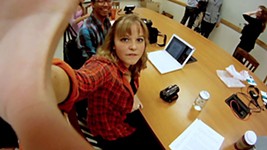Technology, Take Us Away
Are our gadgets and gizmos troubleshooters or troublemakers?
By Nora Ankrum, Fri., March 5, 2010
My friend Will makes a mean quiche, and he brought two over to my house on New Year's Day for brunch. I thanked him later by text; here's the message I sent: "Were still eating tourney delicious quiche BTW. Thanks spuxh for bringing it!" Even though I'm an editor, I try not to be uptight when it comes to texting – but I tell you this: Only a deliberate, pernicious force of otherworldly dominion could turn "your" into "tourney" and "so much" into "spuxh" without my catching it. My "smart" phone is just such a pernicious force.
Admittedly, I find technological progress daunting – a nuisance, even. I'm more enamored of my new garbage disposal than my new smart phone. It's taken me so long to figure out how to properly use my smart phone, in fact, that only my love for my garbage disposal has prevented me from throwing my phone into it. But clearly, I'm not what you'd call an early adopter. I expect more out of normal people, all of whom apparently love their smart phones, and I expect even more out of this year's 1,000 or so people hosting South by Southwest Interactive panels with clever titles like In Code We Trust. These are the people, I imagine, who can handle all the novelty – who can peer into the perpetual blur and see in it the outlines of something beautiful, or at least sane.
As Interactive Festival producer Shawn O'Keefe puts it, Interactive is all about "what's next in the industry." It's where industry players come together to marvel at the latest innovations starting with a lowercased "i" and not only imagine how they'll make our lives better but put into motion the relationships that will lead to the "aha!" moments that will bring us to next year's next big thing. Still, judging by this year's list of panels, I'm not the only one wondering if technology simply causes more problems that it solves.
Help! I'm Blogging, and I Can't Get Up!
Take William Burdette's panel, Swarming Plato's Cave: Rethinking Digital Fantasies: "Technology has always been packaged with promises of better democracy, media, education, minds, and bodies," reads the description. "An intellectual tradition, from Plato onward, questions whether technology can actually deliver on these promises." And then there's Corinne Weisgerber's panel, Is Technology Weakening Interpersonal Relationships? "I was kind of one of those people ... who jumped on that bandwagon right away and accepted the idea that social media is good for authenticity and increases transparency and it's all great," says Weisgerber. "But I think after a year or two, people started reevaluating some of those things, and I think that's kind of where we're at at this point." And then there's Stephanie Klein's panel, Balance Is Bullshit, in which the veteran Austin blogger asks, "How do you find time to approve comments, comment on other people's blogs, drive traffic to your blog, network ...? How do you find time to do all this?"

As technology moves onward and upward, it doesn't always wait for people to catch up. As such, matters of lifestyle (how to manage your time, your relationships, your finances) prove to be popular, if somewhat unexpected, topics at Interactive – so much so that 174 of this year's panel proposals fell into the "self-help/self-improvement" category. "I think as FriendFeed has taken off, Facebook has taken off, Twitter has taken off ... whether you're at home on your computer or on the go on your phone, you're overwhelmed with all this information," says panelist Vince Maniago, a California-based consultant who has worked with Yahoo! Local, Upcoming, and Zvents. "I think the lifestyle topic is really fitting based on where we are with technology. It's not just the geeks anymore – everybody who's going to buy a phone right now is thinking at least about getting a smart phone. ... That's a huge channel of information to you directly wherever you are. I think that impacts your lifestyle greatly."
O'Keefe says that panels addressing lifestyle issues have, "in some form or fashion," always been a part of the event. "Obviously, the nature of technology is to challenge people in new ways, so we do see a lot of these topics," says O'Keefe. "As a result of all this, one of the things that we did differently this year is ... we actually carved the event into different themes." Each theme will be associated with its own location. For example, Love & Happiness – which, O'Keefe says, includes many of the lifestyle-oriented panels – will be found at the Courtyard Marriott. Under the Love & Happiness umbrella, you'll find panel topics such as Funemployed: Success Stories From the Laid Off Community, in which you'll hopefully learn to harness the power of the Internet to solve your life's problems. But whether it's love and happiness you're after at Interactive or just a little business advice, there's no shortage of panelists under every theme sharing these familiar success stories.
Plug In, Plug Out
Just ask panelist Cathy Erway, author of The Art of Eating In: How I Learned to Stop Spending and Love the Stove (Gotham). She not only figured out how to save money by eating in (and writing about it at NotEatingOutInNY.com) but parlayed the endeavor into a career – the kind of career she says might not have been possible without new media. You can also ask Nichelle Stephens about taming the technological beast for financial gain. "I think technology has so infiltrated everyone's lives, why can't we conversely focus on our lifestyle and see how we can use technology better?" asks Stephens, a self-professed "main street" accountant who shares personal finance and small-business advice with clients through her website, KeepingNickels.com. "Class mobility is getting harder and harder, but ... I feel like there's mobility in just having knowledge," she says.
Stephens will be hosting a discussion called The Broke Diaries: Using Blogs and Twitter to Live Cheaply, in which she and fellow panelists plan to do "the opposite of bling-bragging," she says. "I really want people to see that the lack of a fat wallet doesn't keep you from doing a lot of the things you want to do, whether it has to do with ... getting new clothes for a job interview or even starting a business." Stephens believes that the secret lies in the power of the online community: "People are very willing to share information. I've seen that generosity, and sometimes it's so much more valuable than money."
Maniago also believes in the power of the online community, especially social media such as Twitter and Facebook. "There's a lot that I can serendipitously discover about my friends ... through the process of reading their stream," he says. "Then when I see them in person, it can enrich the experience." On the other hand, Weisgerber – who teaches interpersonal communications and public relations in social media at St. Edward's University – says she's starting to worry about social media's downside: "The fun-loving and exciting person that I've created on Facebook for my friends – I'd probably fall short of that quite a bit. What does it do to our relationships when you create these ideal versions of yourself online?" she asks. "What happens when you do meet face-to-face?"
Love & Happiness?
Technology no doubt presents infinite possibilities for making our lives better. But in doing so, it invariably seems to require that we devise clever ways to manage it (as has Diana Potter, panel host for Keeping Sane While Working From Home), employ yet newer technologies and strategies to free ourselves from it (as Maniago and Facebook veteran Scott Marlette propose in their panel, Choosing Offline Activities in a Time-Deprived Lifestyle), or improve ourselves to live up to it (as recommended by Memory Matters! How Do Elephants Do It? panelist Mark Channon). I interviewed Channon – a former grand master of memory ranked third in the world – via e-mail. "You have to learn to manage your mind before you can manage this web of information," he wrote to me. Channon believes that the memory techniques he knows (and plans to share at the festival) – as well as brand new technologies like the iMindMap app launched in February – can help people develop "strategies for capturing, organizing and remembering so you can make better choices."

Maniago and Marlette also hope to explore better ways to make use of the information online. According to Maniago, many of us easily spend 50 hours a week online; meanwhile, we might spend only a couple of hours actually going out with friends. On top of that, the data we share about ourselves online is "being wasted," he says. "We could use that data to better improve our social connections offline and better make decisions about what events we're going to attend and maybe even our travel plans, buying decisions, et cetera. I feel like there's not a good, structured way to use that data because there's just a big stream." For instance, you might want to go to a show, but none of your close friends are into the band you want to see, or you might be looking for an exercise buddy, but your friends aren't available when you are. No problem, says Maniago. That special someone is out there, just not necessarily in your first or second circle of friends, where they're easy to spot. If Maniago has his way, the social media of the future will be able to find that person for you – freeing up even more of your time, of course, for consuming social media.
Weisgerber wonders whether it's such a good idea to be consuming all that social media in the first place. She and her fellow panelists plan to discuss the implications of social networking on family, professional, and romantic relationships. "I think there are a lot of questions we need to start looking at in terms of kids getting on social networking sites and spending hours and hours and hours talking to people online. ... That's displacing time that they would have spent interacting face-to-face." Adults, too, are vulnerable, she says: "That's the time that you would have spent with your partner." Weisgerber knows from experience. Her research requires that she keep up with all the latest innovations in social media; right now her blog is suffering because of her Twitter account, but that's not all – her husband considers himself a "social media widower," she says. "I think there's something to that – that we've come to a point where it's just not possible to keep that up any longer."
Even veteran bloggers are struggling to keep up. At last year's festival, on the panel From Blog to Book Deal, Austin writer Stephanie Klein talked about her experiences leveraging her blogging success. This year, she's bringing as many questions as answers. "I call [the panel] 'Balance Is Bullshit' – not just to demystify the whole work/life balance myth ... but also to offer solutions and have people talk about the technologies that are helping us do it," she says. Klein hit upon the idea at a time when she was juggling three different writing projects: "I was developing a new television show, working on my second book becoming a film, and also working on my next book proposal ... plus keeping up a blog," she recalls. "And I said to myself: 'How do people do this? There have to be technologies out there.'"
From Plato to Panacea

It probably shouldn't be surprising to find people at Interactive looking to technology to solve the problems caused by technology. Luckily for those seeking solutions, Interactive has plenty of smart people – not just smart phones – ready to provide them. I have to admit to being more of a fan of the newfangled than I let on. In addition to my new smart phone and garbage disposal, after all, I also have a new dishwasher and washing machine, as a consequence of recently graduating from apartment life into a real house. This thought has been fresh in mind: Technology is awesome! Of course, I did notice that the floor was all wet around the washing machine a few weeks ago – is that bad?
As my grandmother (and apparently Plato) surely discovered before me, technology does free up your time – just enough to do a lot of troubleshooting. And play a little bridge. Or, in this millennium, update your Facebook status. Interactive may be about what's next, but it also serves as a particularly poignant reminder of just how far we've come, how fast technologies change, and how much energy it takes to keep up. Just remember: You're good enough, you're smart enough, and doggone it, your technology spuxhes you.
Related Panels
The Broke Diaries: Using Blogs and Twitter to Live Cheaply
Friday, March 12, 2pm, Hilton A/B
Is Technology Weakening Interpersonal Relationships?
Friday, March 12, 3:30pm, ACC 12AB
Memory Matters! How Do Elephants Do It?
Friday, March 12, 3:30pm, ACC 8A
The Art of Eating In, Book Reading
Monday, March 15, 10am, Day Stage
Choosing Offline Activities in a Time-Deprived Lifestyle
Monday, March 15, 3:30pm, Hilton J
Balance Is Bullshit
Tuesday, March 16, 12:30pm, ACC 8A
Swarming Plato's Cave: Rethinking Digital Fantasies
Tuesday, March 16, 12:30pm, ACC Ballroom B













